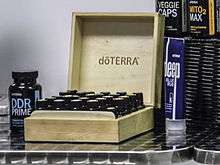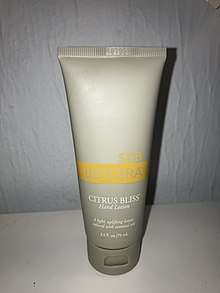doTerra
doTerra (styled dōTERRA) is a multi-level marketing[1][2] company based in Pleasant Grove, Utah that sells essential oils and other related products. doTerra was founded in 2008 by former executives of Young Living and others.[4]
| Private | |
| Industry | Multi-level marketing[1][2] |
| Founded | 2008 |
| Headquarters | , |
Area served | International |
Key people | David Stirling (CEO) |
| Products | Essential oils, home products |
Number of employees | 1,650 (2017)[3] |
| Website | www |
The company and its representatives came under fire repeatedly for misleading claims that their products could help prevent or cure diseases such as cancer, autism, Ebola and more recently, COVID-19, even being the target of a warning from the Food and Drug Administration and the Federal Trade Commission.[4][5][4][6][7] The assertion that aromatherapy can have curative properties beyond relaxation is not supported by scientific research.[8][9][10]
History

The company was established in April 2008 by David Stirling, Emily Wright, David Hill, Corey B. Lindley, Gregory P. Cook, Robert J. Young, and Mark A. Wolfert. Stirling, Wright, and Hill were former executives of Young Living, a company that also sells essential oils via multi-level marketing[4]. Its name is inspired by the Latin phrase for "gift of the Earth." The company initially launched with 25 single oils and ten oil blends.[11]
As of 2013, doTerra reported having about 450 corporate employees, 350 at the Utah headquarters, and 100 at offices in Taiwan, Japan, Europe, and Australia. Later, the company announced that it would build a new headquarters in Pleasant Grove, Utah.[12] The company's products are sold through independent distributors called Wellness Advocates, using a multi-level marketing model to sell its products. Individuals receive commissions based on their own sales and the sales of others in their organization.[4] In 2014, the company was selling over 150 products such as supplements, personal care items, and essential oils.[13]

In 2015, the number of "Wellness Advocates" joining the company grew by more than 120 percent.[14] By year-end 2015, the company claimed that it had generated more than $1 billion in sales.[4] As of 2017, doTerra reported having approximately 1,650 corporate employees and over 3 million Wellness Advocates across 100 countries.[3][15]
Controversies and lawsuits
In August 2013, Young Living filed suit against doTerra for theft of trade secrets, alleging that the company had recreated their production process illegally.[16][17] During the lawsuit between the two companies, Young Living produced an analysis of doTerra products that suggested the company utilized synthetic chemicals in their organic products.[18] Chemist Robert Pappas has said the oils, which were tested by the Centre National de la Recherche Scientifique, did not match any oils sold by doTerra.[19] In October 2014, the Fourth District Court dismissed the claims made against doTerra; the companies also settled lawsuits around faked lab tests, false advertising, and theft of trade secrets and withdrew their negative claims in relation to the purity of each other's products.[1] In July 2018, the court ruled that Young Living acted in bad faith and had misled the court, thus the judge ordered Young Living to cover doTERRA attorney costs.[20]
On September 22, 2014, the U.S. Food and Drug Administration issued an FDA Warning Letter to doTerra for allowing its distributors to market its products as possible treatments or cures for Ebola, cancer, autism, and other conditions in violation of the Food, Drug and Cosmetic Act.[5][21][22][23] Shortly thereafter, federal agents conducted a further investigation of doTerra's files.[4] In response to these actions, doTerra marketing executive McKay Brown stated that they were working to address the issue with their distributors,[24] and the company reported that they had created a "fifty-person compliance team" to identify incorrect marketing materials and to assist distributors with their presentations.[4] Nevertheless, some distributors have continued to claim that doTerra's essential oils can treat specific ailments, and it was alleged in 2018 that some distributors had offered personal stories to customers claiming that their child has benefited from essential oils as a means of working around the restrictions.[6][4]
In April 2016, doTerra sent letters to distributors advising them that a breach in a system where personal information was stored had occurred in March 2016. Personal information potentially acquired in the breach included: name, dates of birth, social security number, address, telephone number, email address, debit and credit card numbers, username, and passwords. The company explained that a third-party vendor was at fault. To compensate, the company offered 24-months of credit monitoring through AllClear, a credit monitoring company.[25][26][27][28]
Subsequent to the 2017 California wildfires, it was reported that some doTerra distributors were promoting the company's products for air purification and protecting against the health effects of smoke from the fires. Air pollution experts countered that the products, in fact, do not clean smoke from the air, and by releasing volatile compounds, they could make air quality worse and potentially dangerous for people with respiratory problems.[29]
In 2020, some doTerra distributors attempted to benefit from public concern regarding COVID-19 by claiming that the company's products have immune boosting properties, despite no scientific evidence to support such claims.[30][31] The Federal Trade Commission warned the company it must stop making such unfounded health claims. The FTC's letter also noted exaggerated earning claims by its consultants: "Claims about the potential to achieve a wealthy lifestyle, career-level income, or significant income are false or misleading if business opportunity participants generally do not achieve such results.[7]"
Projects
doTerra Healing Hands Foundation
The doTerra Healing Hands Foundation is a 501(c)(3) non-profit organization established by doTerra in 2012.[32] In 2016, the foundation partnered with the non-profit organization Choice Humanitarian to send staff and distributors to Nepal and Guatemala to install vented brick stoves for families.[33]
In 2017, the doTerra Healing Hands organization began collecting donations from its distributors in the wake of Hurricane Harvey to cover the costs of providing relief packs containing samples of the company's products to evacuees in Dallas. In October 2017, Pacific Standard reported that after collecting donations, doTerra did not deliver the shipments, allegedly due to weather conditions, and described the incident as "a modern example of malfeasance masquerading as altruism—a type of scam often found in multi-level marketing organizations." In an update to their report in March 2018, Pacific Standard noted that doTerra did eventually send shipments of doTerra hygiene packs to residents in Houston.[34]
References
- Harvey, Tom (October 23, 2014). "Judge dismisses much of lawsuit between rival Utah 'oils' companies". The Salt Lake tribune. Retrieved 16 March 2015.
- Miers, Claire (April 8, 2015). "Essential oils a booming business". Star-Telegram. Retrieved July 22, 2015.
- "doTERRA on the Forbes America's Best Midsize Employers List". Forbes. Retrieved 2018-05-13.
- Monroe, Rachel (October 9, 2017). "How Essential Oils Became the Cure for Our Age of Anxiety". New Yorker. Retrieved February 26, 2018.
- Ohlheiser, Abby (24 September 2014). "FDA warns three companies against marketing their products as Ebola treatments or cures". Washington Post. Retrieved 26 September 2014.
- Butler, Kiera (February 23, 2018). "How Multilevel Marketing Companies Got the Autism Community Hooked on Essential Oils". Mother Jones. Retrieved February 26, 2018.
- Graham, Megan (April 27, 2020). "FTC warns multilevel marketing company sellers about coronavirus health and earnings claims". CNBC. Archived from the original on May 22, 2020. Retrieved May 22, 2020.
- Lee, Myeong Soo; Choi, Jiae Choi (2012). "Aromatherapy for health care: an overview of systematic reviews". Maturitas. 3 (71): 257–260.
- Posadzki, P; Alotaibi, A; Ernst, E (2012). "Adverse effects of aromatherapy: A systematic review of case reports and case series". The International Journal of Risk & Safety in Medicine. 24 (3): 147–61. doi:10.3233/JRS-2012-0568. PMID 22936057.
- "Essential Oils: Poisonous when Misused". www.poison.org. Retrieved 2017-12-01.
- Guinness, Meredith. "Stratford Woman Teams With Sister-In-Law In Essential Oil Business". Stratford Daily Voice.
- Allred, Cathy. "doTERRA to bring 330 new jobs to Utah County (press release)". Daily Herald (February 17, 2013). Provo, Utah. Retrieved 16 March 2015.
- "dōTERRA Fact Sheet" (PDF). dōTERRA. Archived from the original (PDF) on 22 September 2014. Retrieved 21 September 2014.
- Home.org, Business For. "doTerra Hit $100 Million Per Month". Retrieved 2018-07-04.
- Flagler, Doug. "doTerra YOU Global Convention". Fox 13 Salt Lake City.
- Harvey, Tom (1 August 2013). "Essential oils rivalry spills into Utah courts". Salt Lake Tribune. Retrieved 19 June 2014.
- "Young Living Essential Oils, LC (Plaintiff) v. doTERRA, Inc., et al. (Defendants)" (PDF). United States District Court for the District of Utah Central Division. July 18, 2013. Archived from the original (PDF) on October 23, 2014. Retrieved 2014-08-20.
- Keeson, Arvid (15 August 2014). "Damning Evidence That Young Living and DoTERRA's Essential Oils are Adulterated". Utah Stories. Retrieved 6 September 2014.
- Markosian, Richard (21 August 2014). "Report Used in Young Living Farms Case Against DoTERRA Suspect". Utah Stories. Retrieved 6 September 2014.
- Stilson, Ashley. (July 16, 2018). "Young Living to pay $1.8M for Doterra attorney fees after lengthy court battle", Daily Herald . Retrieved February 7, 2019.
- Vowell, Nicole (September 25, 2014). "2 Utah companies respond to FDA warning over health claims". Deseret News. Retrieved 26 October 2014.
- Mitchell, LaTonya M (22 September 2014). "Warning letter to dōTERRA International, LLC". US Food and Drug Administration, Public Health Service. Retrieved 8 November 2014.
- Papple, Dawn. (September 25, 2014) "FDA Warning Letters: Young Living, dōTERRA Consultants Must Cease Marketing Claims That Essential Oils Fight Disease", Inquisitr. Retrieved January 31, 2019.
- Hanson, Kurt (September 25, 2014). "FDA sends warning to doTERRA and Young Living about oils". Daily Herald. Provo, Utah. Retrieved 16 March 2015.
- Davis, Jeremy Seth (April 19, 2016). "DōTERRA breach exposes customer info; including SS, DOB, and addresses". SC Media. Retrieved September 28, 2017.
- Associated Press (April 27, 2016). "Utah essential oil company announces third-party data breach". Seattle Times. Retrieved September 28, 2017.
- Romero, McKenzie (April 25, 2016). "doTERRA letter informs customers of possible data breach". Deseret News. Retrieved September 28, 2017.
- "Letter from Hunton & Williams Law Firm (on Behalf of DoTerra) to the Office of the New Hampshire Attorney General" (PDF). State of New Hampshire Department of Justice. April 21, 2016. Retrieved September 28, 2017.
- Butler, Kiera (October 14, 2017). "No, "Essential Oils" Will Not Clear the California Fire Smoke Out of Your Air". Mother Jones. Retrieved October 26, 2017.
- Graham, Megan (March 13, 2020). "Multilevel marketing sellers are using coronavirus to push oil and vitamin sales on Facebook". CNBC. Retrieved March 20, 2020.
- Stevens, Ashlie D (March 17, 2020). "How essential oil sellers are trying to profit off COVID-19 fears". Salon. Retrieved March 20, 2020.
- doTerra Healing Hands Foundation
- Neely, Karissa (19 May 2016). "doTerra Employees Install Stoves in Guatemala, Nepal". Daily Herald. Retrieved 17 January 2019.
- Marini Higgs, Micaela (October 6, 2017). "After a natural disaster, some multi-level marketers profit handsomely off relief efforts". Pacific Standard. Retrieved July 18, 2018.